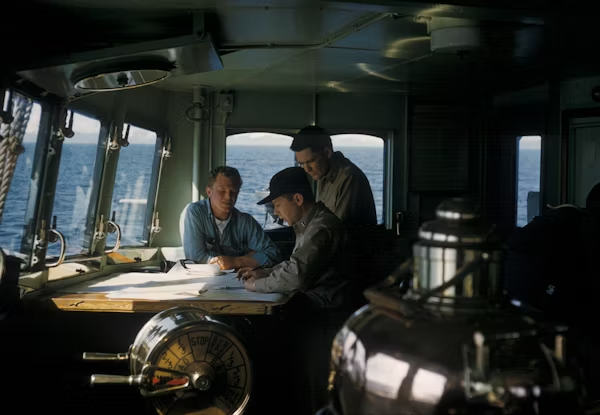In the modern maritime world, communication and navigation are more than just tools—they are lifelines. From cargo ships crossing oceans to fishing boats navigating tricky coastlines, the ability to send clear messages and pinpoint positions is essential for safety and efficiency. One organization that plays a vital role in this arena is Amerc. Dedicated to developing skills and knowledge in marine radio operations and electronic navigation, Amerc serves as a cornerstone for professional training in the maritime industry.
While many institutions focus on general maritime education, Amerc’s mission is laser-focused on improving expertise in these highly specialized technical areas. By doing so, it not only supports seafarers in their careers but also helps maintain the high safety standards that the maritime industry depends upon.
What is Amerc?
Amerc stands for a recognized body that coordinates and supports education in marine radio and navigational electronics. This includes overseeing training standards, guiding course development, and ensuring that learners meet the competencies required in today’s technologically advanced maritime environment.
It acts as a network for training providers, helping them stay aligned with regulations and industry expectations. Through collaboration and standardized practices, Amerc ensures that whether a trainee is learning in one part of the country or another, they receive consistent, high-quality instruction.
The Mission and Vision
At its heart, Amerc’s mission is to promote knowledge, skill, and professionalism in the use of marine communication and navigation technology. The organization envisions a maritime workforce where every operator is proficient in using advanced systems, capable of responding to emergencies, and confident in handling high-pressure communication scenarios.
The vision extends beyond national borders—Amerc’s work contributes to a global standard of safe navigation, making international waters a safer place for all.
Why Marine Radio and Navigation Matter
Marine radio systems are the backbone of maritime communication. They allow ships to talk to one another, connect with shore stations, and send out distress calls during emergencies. On the other hand, electronic navigation tools—such as GPS, radar, and electronic chart systems—enable vessels to travel safely and accurately, even in poor weather or low-visibility conditions.
Without proper training in these areas, the risks at sea multiply. Amerc recognizes this and ensures that seafarers are not just familiar with the technology but fully competent in using it effectively.
Amerc’s Role in Training Standards
Amerc collaborates closely with training centers, instructors, and industry experts to set clear standards for course content and delivery. These standards are regularly updated to reflect changes in technology, regulations, and international maritime conventions.
By maintaining rigorous benchmarks, Amerc helps ensure that every certified seafarer can handle the complex demands of modern marine operations, from routine communications to emergency protocols.
Course Offerings and Areas of Study
Training under the Amerc framework covers a wide range of topics, including:
GMDSS (Global Maritime Distress and Safety System) operation and procedures.
Proper use of VHF, MF, and HF radio equipment.
Understanding and operating electronic navigation aids like radar and GPS.
Maintenance basics for radio and navigation systems.
While Amerc itself may not always deliver courses directly, it supports training institutions in creating programs that meet its quality benchmarks.
Who Benefits from Amerc Training
Amerc’s programs are not limited to seasoned captains or large vessel operators. The training benefits:
Merchant navy professionals who require certifications for career advancement.
Fishing vessel crews who operate in busy or hazardous waters.
Recreational sailors aiming to improve safety and communication skills.
Maritime students preparing for professional qualifications.
This wide reach ensures that maritime safety standards are upheld across all levels of seafaring.
Keeping Up With Technological Changes
The maritime industry is constantly evolving, with new technology and systems introduced regularly. Amerc plays a key role in helping training centers keep pace. Whether it’s incorporating satellite communication advancements or integrating digital chart systems, Amerc ensures training materials reflect the most current tools available.
This forward-looking approach means trainees are prepared not only for today’s challenges but also for the developments on the horizon.
Amerc and Global Maritime Safety
Maritime safety is a shared responsibility. Ships from different nations often cross paths, and communication barriers can have dangerous consequences. By supporting consistent and high-quality training, Amerc contributes to a global standard where operators can communicate effectively regardless of their country of origin.
This shared understanding is vital during emergencies when seconds can make the difference between a safe rescue and disaster.
The Importance of Standardized Training
A key strength of Amerc’s approach is uniformity. Standardized training ensures that all seafarers—no matter where they trained—have the same baseline competence. This means a vessel’s crew can work together efficiently, confident that every member understands the same procedures and systems.
Without this standardization, the maritime world could face confusion, miscommunication, and increased risks.
Supporting Trainers and Institutions
Amerc doesn’t just focus on students—it also supports trainers. By providing resources, guidance, and opportunities for professional development, Amerc ensures that instructors remain experts in their field.
This investment in educators has a ripple effect: better-trained instructors produce better-trained seafarers, raising safety and efficiency levels across the industry.
Certification and Recognition
Many maritime roles require recognized certification to operate certain equipment. Amerc works to ensure that the training it oversees leads to qualifications respected by employers and regulatory bodies.
This recognition opens doors for seafarers, allowing them to work internationally and progress in their careers with confidence.
Collaboration with Industry and Regulators
Amerc maintains close links with maritime authorities, shipping companies, and industry stakeholders. This ensures its training standards align with real-world needs and legal requirements.
Through this collaboration, Amerc bridges the gap between classroom learning and practical application at sea.
Impact on Career Development
For individuals in the maritime sector, Amerc-aligned training can be a career-defining step. Employers value candidates who can demonstrate certified competence in communication and navigation systems.
In many cases, these qualifications are prerequisites for promotion, making Amerc an essential part of professional growth.
Future Outlook for Amerc
Looking ahead, Amerc is expected to play an even greater role as maritime technology advances. Areas like autonomous vessel operation, AI-driven navigation systems, and enhanced satellite communications will require new training modules and updated competency standards.
By staying ahead of these changes, Amerc will continue to safeguard the maritime industry’s most important asset—its people.
Conclusion
In a world where maritime operations grow more complex by the day, Amerc stands as a vital guardian of skill, safety, and professionalism. By setting high standards, supporting training providers, and keeping pace with technological change, it ensures that seafarers are ready for the challenges of today and tomorrow.
From seasoned captains to new maritime students, everyone benefits from the knowledge and confidence that Amerc-aligned training provides. At sea, where communication and navigation can be the difference between safety and disaster, that kind of preparation is priceless.
FAQs
Q1: What does Amerc focus on?
Amerc specializes in marine radio operations and electronic navigation training.
Q2: Who can take Amerc-aligned training?
Anyone in the maritime sector, from professionals to recreational sailors.
Q3: Does Amerc offer courses directly?
It primarily supports training centers rather than delivering courses itself.
Q4: Are Amerc certifications recognized internationally?
Yes, they are respected by employers and regulatory bodies worldwide.
Q5: Why is Amerc important for maritime safety?
It ensures operators can communicate and navigate effectively, reducing risks.
Q6: Does Amerc update its training regularly?
Yes, it keeps materials current with the latest technology and regulations.


